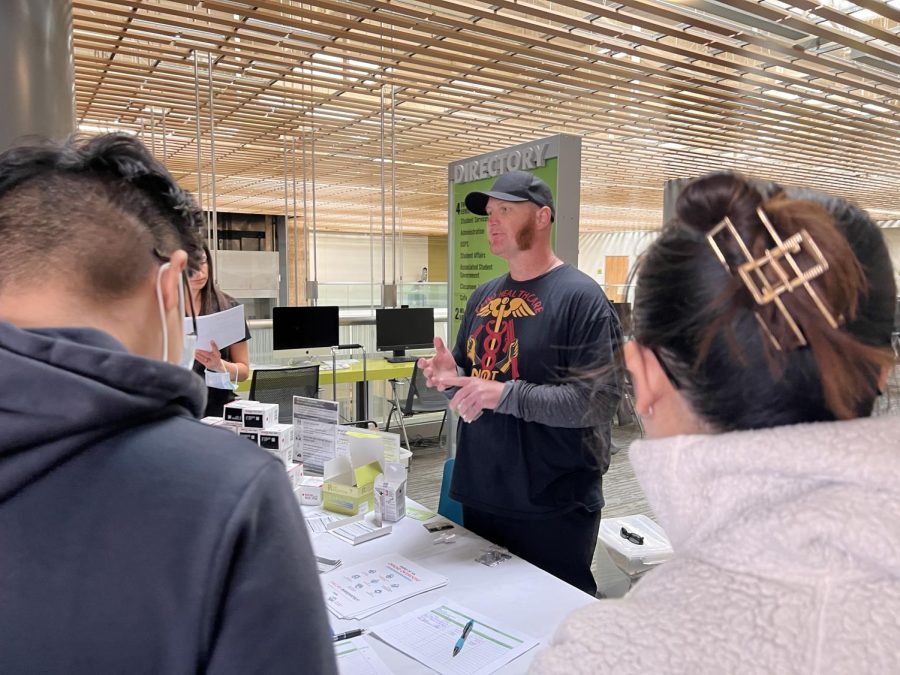Opioid deaths in San Diego County have reached an all-time high. In 2021, there were 1,100 recorded deaths from drug overdoses, the majority due to fentanyl, according to the San Diego County Office of Education. By August 2022, that number had reached 1,300, according to the San Diego County News Center. In June 2022, the San Diego County District Attorney’s office declared fentanyl deaths a public health crisis.
Six months later, the county Board of Supervisors voted unanimously to address the crisis through increased outreach, education, early intervention, and expanded distribution of resources like Narcan (naloxone) and fentanyl test strips. Through this initiative, the county has partnered with the Harm Reduction Coalition of San Diego (HRCSD) to lead a series of educational sessions at Mesa College on how and when to administer naloxone and hand out free supplies.
The second in a series of six scheduled training sessions took place on Mar. 1 on the Mesa Student Services Terrace. The session was hosted by the Mesa Student Health Services staff and led by HRCSD’s Scottt Jones. The tables were loaded with stacked boxes of Narcan (naloxone), fentanyl test strips, travel-sized hand sanitizers, bandages, and sack lunches for attendees. See where to catch an upcoming training here.
As participants arrived, they were greeted and asked to sign in with their names and mark the number of free boxes of naloxone they took. There was an option for those who did not want to sign their name but still wanted to take some free boxes of naloxone. Jones urged attendees to take a box of the life-saving medicine: “When it comes to the Narcan, it’s better to have it and not need it, than to need it and not have it.”
Jones explained that law enforcement won’t fault anyone for having naloxone on hand. In fact, the Sheriff’s department participates in naloxone distribution throughout the county, according to the County of San Diego Communications Office.
Narcan (naloxone) is a nasal spray that can reverse the effects of an opioid overdose. It is safe to use, even if an individual is not experiencing an overdose, or if they do not have drugs in their system. For this reason, Jones explained to participants that it is best to administer naloxone as soon as an overdose is suspected, even if they are not certain that it is an opioid overdose.
Jones informed participants about the signs of an overdose, which include blue or ashy lips or fingernails, failure to respond to stimuli, slow or shallow breathing, gasping, gurgling, snoring, or vomiting. Participants were advised to call 911 as soon as these signs emerge and say, “the person is unconscious and not breathing.” A handout distributed at the training session says, in bold print, “You don’t have to say that any drugs are involved until the ambulance arrives.”
The sessions were taught in waves, as visitors flowed through the busy terrace area next to the café. Before and after each educational session, the new group of participants was asked to fill out a survey about their knowledge of naloxone—how and when to use it, where to get it– and whether they’ve had any experience with an overdose. Each training given by Jones took about five minutes to complete and then allowed time for the crowd’s questions.
Jones opened up a box of naloxone, pulled out the two nasal sprays inside, and showed the crowd how to administer the spray. Participants were taught to start by administering one full nasal spray as the first dose, then wait four minutes while administering rescue breaths, and if the person has not started breathing at least one breath per five seconds on their own, administer a second dose, then continue this process until they can breathe or until first responders arrive.
Jones passed out business cards with information for how to contact him or Tara Buesig, the CEO and Founder of HRCSD, and encouraged those attending the training to call either one of them or HRCSD’s main number 1-888-NARCAN-0 anytime they’re going out to party and need supplies, or if they need their drugs tested for impurities.
“We can’t be too safe these days when it comes to the fentanyl,” said Jones.
HRCSD does more than conduct these training sessions with community partners like Mesa College. CEO and Founder, Tara Buesig, acknowledged that the increased county funding and community support provide for the organization’s ability to deliver naloxone and fentanyl test strips to anyone in the county; test the composition of any drug; exchange syringes; hand out hygiene and wound-care kits, fishing and cooking supplies; organize food and clothing drives; and in some cases, arrange shelter during inclement weather.
There’s a strong need for these services, especially for college students. The California Department of Public Health Overdose Surveillance Dashboard reported an increase in opioid-related overdose deaths in youth aged 10-19 years from 54 deaths in 2018 to 274 in 2020. This constitutes an increase in the overdose deaths of young people of over 400% in only two years, greatly due to fentanyl.
“Harm reduction recognizes that people are using drugs,” explained Buesig. HRCSD is working with the county and its community partners to make it possible for people in San Diego County to do so safely.
HRCSD strives to use compassionate techniques to meet people where they are and address the crisis at a one-on-one level, by taking care, education, and life-saving medicine directly to the individuals who need it.
“We can’t arrest our way out of the fentanyl crisis. We have a duty to make sure there’s enough information and access. If we don’t talk about this now, it’s going to be a lot worse. People are dying.” said Buesig.
For those interested in getting involved in fighting the opioid crisis in San Diego County, HRCSD welcomes volunteers and donations. You can learn more here.


